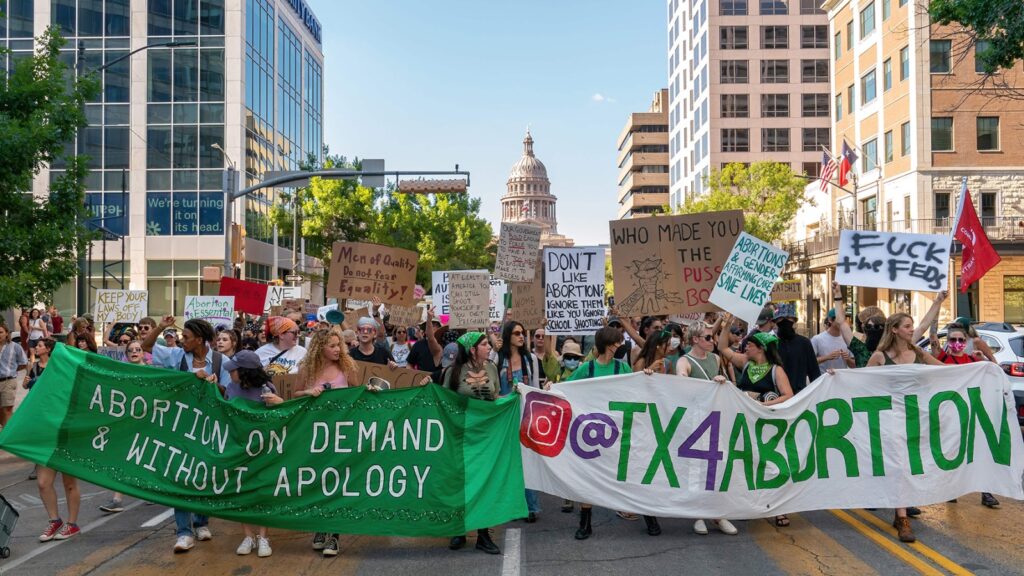
Texas Forced This Woman to Give Birth to a Stillborn Son. She’s Suing
After multiple miscarriages, Kiersten Hogan thought she would never be able to carry a pregnancy to term. She’d nearly given up hope when in June 2021 she learned she was pregnant. But at just 19 weeks — days after Texas’ Senate Bill 8 went into effect — Hogan woke up at 5 a.m. in excruciating pain. She called 911 and was instructed to unlock her front door and lay on the ground until EMTs arrived. “It was the longest 5 minutes of my life,” Hogan recalled on Monday.
Her water had broken. By the time she arrived at the hospital, she had lost too much amniotic fluid for her son to survive — but hospital staff didn’t tell her that. “They didn’t tell me much about my son’s chances of survival. But the one thing they did make clear repeatedly was that I should not leave,” a tearful Hogan said Monday. “I was told that if I tried to discharge myself, or seek care elsewhere, that I could be arrested for trying to kill my child. So of course, I stayed.”
Hogan recounted a harrowing five days inside the hospital, where she says religious counselors repeatedly came to visit her, even though she had declined pastoral care. She recalled being terrified of even going to the bathroom — afraid she would go into premature labor, and be arrested.
“On the fifth day in the hospital, while using the bathroom, my son started to enter the birth canal,” Hogan said. “I was rushed to labor and delivery where I gave birth to him stillborn.”
The next morning she was discharged, and told she could return to work the next day, “as if nothing had happened,” Hogan said.
Hogan is one of eight new plaintiffs who joined a lawsuit against the state of Texas on Monday, seeking clarification about what qualifies as a medical emergency under Texas’ medieval abortion bans. Also on Monday, lawyers for the Center for Reproductive Rights, which filed the initial suit in March, asked a district court in Travis County for a temporary injunction blocking Texas’ abortion bans in cases of pregnancy complications as the case continues.
The original suit was filed on behalf of five women who were denied abortion care and two obstetrician-gynecologists who work in the state. It challenges the state’s three, overlapping bans: a criminal ban that pre-dates Roe v. Wade, a trigger ban — now in effect — passed in anticipation of Roe being overturned, and S.B. 8, an de facto ban on abortion after about six weeks of pregnancy. All three bans ostensibly include exceptions for medical “emergencies,” but the laws’ vague language has contributed to widespread confusion over what qualifies — and stiff penalties that have made medical providers fearful of offering treatment that could put them in legal jeopardy. Doctors who are found guilty of providing an abortion in violation of the bans can face up to 99 years in prison, a minimum of $100,000 in fines, and the loss of their medical license.
Among the eight women who joined the lawsuit on Monday, some, like Hogan, were forced to give birth against their will to children who survived for vanishingly short periods of time.
Kylie Beaton learned her child had alobar holoprosencephaly, a condition that causes the head to grow at an abnormal speed. By the time she received the diagnosis at 20 weeks, her baby’s head was the size of a 24-week-old. She was past the cut-off for an abortion in neighboring New Mexico. By the time she was 28 weeks pregnant, her baby’s head was the size of a 39-week old fetus. She asked to be induced, but providers refused, citing the state’s abortion ban. At 35 weeks, Beaton was finally granted a cesarean section. Her son survived for four days.
Samantha Casiano learned her baby had anencephaly — a condition in which a fetus develops missing pieces of her brain and skull — at her 20-week scan. It is a fatal diagnosis. Casiano says she was told she would have to go through with the pregnancy, prescribed an antidepressant and sent home. She spent the remainder of her pregnancy accepting well-wishes from strangers, while planning a funeral for her daughter. Her daughter lived for four hours after birth.
After Elizabeth Weller’s water broke at 19 weeks, hospital staff suggested she “pray,” even as they informed her her baby had no chance of surviving without the amniotic fluid. Weller says she was first prescribed antibiotics to prevent infection, then told she could not obtain an abortion because as long as she was on antibiotics she would be too healthy to necessitate the procedure. Her infection ultimately worsened, spreading to the placenta and the amniotic fluid, and the hospital finally induced labor. Her daughter did not survive the birth.
“It breaks my heart that the state that I love is denying me and my neighbors lifesaving healthcare, prolonging our grief and mourning — and for what? Families like mine deserve better,” Weller said on Monday, “Life is fragile enough. Everyone’s reason for seeking out an abortion is personal to them and valid.”



